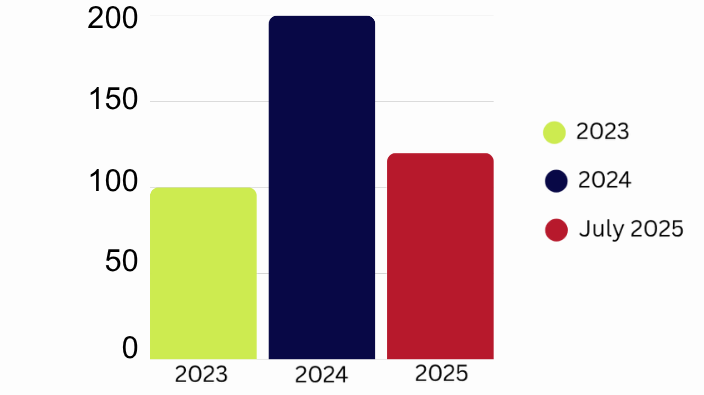Published: November 17, 2025
Despite increased awareness and evolving policies, bullying and harassment remain real and underreported issues within the maritime industry. These behaviours can be subtle or overt, but their impact on mental health, team dynamics and operational safety is profound.
Over the past 7 years of working with seafarers, we have listened to countless stories of individuals who felt excluded, belittled or intimidated while onboard. These experiences are not isolated. Too often, they are normalised or dismissed, especially in hierarchical or multicultural settings where speaking up can feel unsafe.
Why is bullying and harassment an issue?
Psychological safety is a key element in the foundation of safe and efficient operations. When crew members feel anxious, afraid to ask questions, or hesitant to report mistakes, the risk to vessel safety increases. Harassment also erodes trust among the crew and contributes to mental health struggles such as anxiety, depression and burnout. Over time, this not only harms the individual but weakens the crew as a whole, and can lead to accidents and serious incidents. When seafarers feel unsupported or targeted, they may become withdrawn, avoid communication or begin to mentally check out. These behaviors reduce cohesion and situational awareness, both of which are essential for effectively managing risk at sea.
What it looks like onboard
Bullying and harassment at sea can take many forms. It might include:
- Exclusion from group conversations or decisions
- Intimidation, yelling or public humiliation
- Repeated, inappropriate jokes or comments
- Misuse of authority or unfair treatment
- Cultural or gender-based discrimination
In a closed environment like a vessel, even small actions can have outsized effects. The isolation of life at sea means there is often little escape from harmful dynamics.
What the data shows
MHSS has observed a concerning upward trend in reports of bullying, harassment, and sexual assault through our 24/7 helpline.
Compared to 2023, the number of cases in 2024 almost doubled. And in 2025 - with just over half the year gone - we’ve already received more than 60% of last year’s total reports.
If this trend continues, 2025 is likely to surpass previous years, underlining the need for continued education, support systems, and a zero-tolerance approach to toxic workplace behaviors.

The impact: mental health and safety
A failure to address harassment can lead to serious psychological outcomes. Some of the most common consequences we see include:
- Anxiety, insomnia and chronic stress
- Depressive symptoms and suicidal thoughts
- Increased medical disembarkations
- Decreased retention and long-term disengagement
These issues are not just personal. They affect safety culture, emergency preparedness and the ability of crews to respond to high-pressure situations.
Practical responses: how to intervene
When bullying or harassment occurs onboard, crew and management can take the following steps:
- Acknowledge: Don’t dismiss reports or downplay experiences. Listen and validate.
- Document: Keep clear records of incidents, patterns, and any action taken.
- Escalate appropriately: Use the reporting structures available within your company and/or flag state.
- Seek support: Confidential mental health services can provide relief and guidance.
- Lead by example: Officers and senior crew should consistently demonstrate respectful and inclusive behavior, setting a positive tone for the entire crew.
What seafarers are telling us
We’ve received powerful feedback from those who have accessed mental health support through our services. When we first started offering support, here’s what they told us
“Every morning I woke up with fear. I didn’t know if I could get through another day onboard.”
“I felt completely alone - like no one would believe me or stand up for me.”
“The bullying made me question if I even belonged at sea. I started thinking maybe I should just quit my job and go home.”
“There was no escape. I had to face the same people every day, and it felt like I was trapped.”
“I couldn’t focus on my work anymore. I was anxious all the time, not eating or sleeping properly.”
And here is what we heard from the same seafarers when stabilisation was completed:
“Speaking with someone who really listened was the first time I felt safe in weeks.”
“You helped me make sense of what was happening and reminded me that it wasn’t my fault.”
“Knowing there was a plan and that someone was taking my situation seriously changed everything for me.”
“After your support, I felt calm enough to focus on my duties again and stop worrying all day.”
“Thank you for standing by me and helping me find a way forward - I feel like myself again.”
These words remind us that even small interventions can make a meaningful difference - and that no one should have to deal with these issues in silence.
How MHSS supports Steamship Members
At Mental Health Support Solutions (MHSS), we’re proud to partner with Steamship Mutual to provide their Members and their crews with comprehensive mental health support. Our services include the following:
- A FREE 24/7 multilingual helpline staffed by clinical psychologists
- Discounted access to
- Onboard psychological support
- Leadership training on psychological safety and respectful communication
- Workshops focused on DEI and anti-harassment practices
All of our work is confidential, non-judgmental and rooted in both clinical expertise and a deep understanding of the maritime industry. We aim to empower both individuals and organisations to take meaningful steps towards creating a safer, more inclusive workplace.
What owners and managers can do
Creating a culture of respect and safety onboard starts at the top. We recommend:
- Fully enforced anti-harassment policies that are clearly communicated and supported by training and accountability mechanisms.
- Inclusive leadership training for officers to help them build and lead diverse teams.
- Encouraging open dialogue and anonymous feedback to foster trust and transparency.
- Making support services clearly visible and readily accessible.
Most importantly, talk with and listen to your crew. Take time to understand their experiences and actively involve them in building the positive culture you want to see onboard.
Conclusion
Tackling bullying and harassment is about more than just compliance - It is about building trust, ensuring safety and supporting wellbeing. When crews feel respected, valued and heard, they perform better, stay longer and are more likely to speak up and intervene when something goes wrong.
We owe it to every seafarer to make their workplace not only physically safe, but psychologically safe as well.
In our next article, we will take a closer look at how bullying and harassment disproportionately affect cadets and young seafarers and why losing them means losing the industry’s future talent and leadership.


